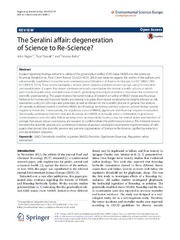The Seralini affair: degeneration of Science to Re-Science?
Permanent lenke
https://hdl.handle.net/10037/8858Dato
2015-08-29Type
Journal articleTidsskriftartikkel
Peer reviewed
Sammendrag
A paper reporting findings relevant to safety of the genetically modified (GM) maize NK603 and the herbicide
Roundup (Séralini et al., Food Chem Toxicol. 50:4221–4231, 2012) was retracted against the wishes of the authors, and
subsequently republished in another peer-reviewed journal (Séralini et al. Environ Sci Europe, doi:10.1186/s12302-
014-0014-5, 2014). These events exemplify a trend in which disputes, between interest groups vying for retraction
and republication of papers that report controversial results, overshadow the normal scientific process in which
peer-reviewed publication stimulates new research, generating new empirical evidence that drives the evolution of
scientific understanding. This paper reviews the current status of research on safety of NK603 maize and Roundup
herbicide for human and livestock health, and attempts to glean from recent developments insights relevant to risk
assessment policy for GM crops and pesticides, as well as relevant to the scientific process in general. Our analysis
of currently published evidence confirms NK603 and Roundup are kidney and liver toxicants at levels below current
regulatory thresholds. Consequently, the regulatory status of NK603, glyphosate and Roundup requires reevaluation.
Additionally, preliminary evidence indicates Roundup and NK603, individually and in combination, may increase
tumor incidence and mortality. Follow-up long-term carcinogenicity studies, using test animal strains and numbers of
animals that assure robust conclusions, are required to confirm/refute this preliminary evidence. The inherent tension
between the scientific process and commercial interests of product developers necessitates implementation of safeguards
that protect the scientific process and prevent degeneration of Science to Re-Science (typified by retraction
and republication disputes).
Beskrivelse
License:Creative Commons Attribution 4.0 International License (http://creativecommons.org/licenses/by/4.0/)


 English
English norsk
norsk